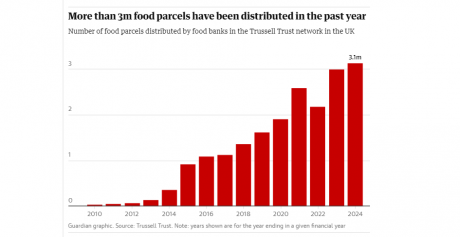The headline is shocking, nearly three in ten teachers bring in food for hungry pupils according to a recent report. This is because they are concerned for their welfare, according to a recent survey carried out by the Teacher Tapp app for the food charity Fareshare. As an academic, I would like to know the methodology of this survey, which isn’t clear from the news reports: how many teachers were interviewed and what questions were they asked? The number does sound extreme, but more reliable statistics and reports do show there is a significant problem with child poverty and hunger. A recent report by the Joseph Rowntree Foundation (2024) found that ‘six in ten households in the bottom fifth of incomes (58%) had either cut down on or skipped meals, or gone hungry because there was not enough money for food. That is 3.4 million households in the bottom fifth of incomes going without the food they need’ (p. 117). These are mind boggling numbers; poverty stricken households would form one of the biggest cities in the UK.
I appeared on Talk TV (August 29th 2024) exploring this issue with Mike Graham. I explained that it was not parents who were to blame in the vast majority of cases, but poverty. Many parents are time-poor and economically impoverished after years of rising costs, stagnant wages and inflation. This means that their children, despite their very best efforts, can go hungry. Some teachers are personally stepping in by giving their pupils food while others know that their school, local authority or district is addressing the situation. In London, the Mayor has committed to providing all primary age children with free school meals for the next four years. This policy echoes similar strategies carried out by the likes of Kamala Harris’s running mate, Tim Walz in Minnesota, who has helped enact a law for universal free school meals. Research seems to indicate that this is a much fairer way of addressing food poverty than means-testing for free school meals (FSM). The reasons for this are complex, but one factor is that children from poorer backgrounds feel less isolated and ‘singled out’ if everyone has FSM. It seems this is becoming a policy issue in America, and could become one here as the levels of child poverty look set to rise.
Government policy has clearly played a big part in driving children into poverty. In 2017, the Conservative government enacted legislation which meant that families with more than two children did not receive child benefit for the third child. Government statistics show that 440,000 households have been affected by this legislation. The Child Poverty Action Group (CPAG) claims that this means that 1 in 9 children are affected by this ruling (1.6m). Their research uncovers the human cost involved. I was particularly struck by the very troubling stories which they unearthed. This shocking account is just one of many:
‘As a family we have started to rely on food banks, winter months are horrendous as we can’t afford a big gas bill so we have to bundle the children with extra blankets, we have just moved to a property with no carpet and there is no possible way of affording any carpet….The adults of the house will have to skip meals so the children have full stomachs. My partner is hardly at home because he works so hard to keep us afloat so he is missing so much of his children’s upbringing.’
(Couple with three children, working household (at least one parent in full-time work) (CPAG 2024)
One of the best articles on the topic is by the former chancellor Gordon Brown in the Guardian. He illustrates that we are facing a real crisis: half the children in families of three or more are in poverty; tooth extractions have risen massively; and the average height of children is decreasing as a result of poor nutrition. In another article, he uses this food bank graph to show how the problem has grown massively recently:

It felt a bit unreal discussing these problems in the island of privilege of the Talk TV station — as it would in any TV studio — but I felt Mike Graham gave me a fair hearing. Although I am sure our views do not align, I felt pleased to raise these points and others on a TV station which leans strongly to the ‘right’.
References
Child Poverty Action Group (CPAG) (2024) New DWP statistics: 1 in 9 children now hit by two-child limit URL: https://cpag.org.uk/news/new-dwp-statistics-1-9-children-now-hit-two-child-limit (Accessed 30/08/2024)
Joseph Rowntree Foundation (JRF) (2024) UK Poverty 2024 URL: https://www.jrf.org.uk/uk-poverty-2024-the-essential-guide-to-understanding-poverty-in-the-uk (accessed 30/08/2024)
